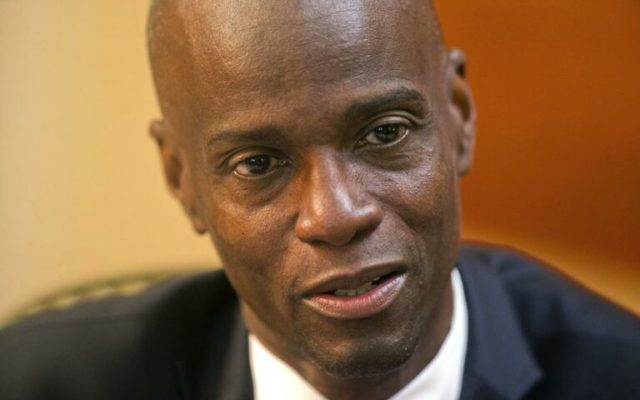Haiti in upheaval: President Moïse assassinated at home

PORT-AU-PRINCE, Haiti (AP) — A squad of gunmen assassinated Haitian President Jovenel Moïse and wounded his wife in an overnight raid on their home Wednesday, inflicting more chaos on the Caribbean country that was already enduring gang violence, soaring inflation and protests of his increasingly authoritarian rule.
Interim Prime Minister Claude Joseph, who confirmed the killing, said the police and military were in control of security in Haiti, the poorest country in the Americas where a history of dictatorship and political upheaval have long stymied the consolidation of democratic rule.
In an interview with The Associated Press, Joseph called for an international investigation into the assassination, said that elections scheduled for later this year should be held and pledged to work with Moïse’s allies and opponents alike.
“We need every single one to move the country forward,” Joseph said. He alluded to enemies of the president, describing him as ’’a man of courage″ who had opposed ’’some oligarchs in the country, and we believe those things are not without consequences.″
Despite Joseph’s assurances that order would prevail, there was confusion about who should take control and widespread anxiety among Haitians. Authorities declared a “state of siege” in the country and closed the international airport.
The normally bustling streets of the capital, Port-au-Prince, were empty and quiet Wednesday. Sporadic gunshots were heard in the distance, public transportation was scarce, and some people searched for businesses that were open for food and water. Businesses had been ransacked in one area earlier.
Bocchit Edmond, the Haitian ambassador to the United States, said the attack on the 53-year-old Moïse “was carried out by foreign mercenaries and professional killers — well-orchestrated,” and that they were masquerading as agents of the U.S. Drug Enforcement Administration. The DEA has an office in the Haitian capital to assist the government in counternarcotics programs, according to the U.S. Embassy.
Moïse’s wife, Martine, was in stable but critical condition and efforts were under way to move her to Miami for treatment, Edmond said in Washington.
Haiti has asked the U.S. government for assistance with the investigation, he said, adding that the assassins could have escaped over the land border to the Dominican Republic or by sea.
The Dominican Republic said it was closing the border and reinforcing security in the area, describing the frontier as ″completely calm.″
Haiti appeared to be heading for fresh volatility ahead of general elections later this year. Moïse had been ruling by decree for more than a year after failing to hold elections, and the opposition demanded he step down in recent months, saying he was leading it toward yet another grim period of authoritarianism.
Joseph said the heavily armed gunmen spoke Spanish or English, but he gave no details on the attack.
It was a testament to Haiti’s fragile political situation that Joseph, who was only supposed to be prime minster temporarily, found himself in charge. Joseph was considered a protege of Moïse.
But Haiti appears to have few other options. The Supreme Court’s chief justice, who might be expected to help provide stability in a crisis, died recently of COVID-19.
The main opposition parties said they were greatly dismayed about the killing.
“In this painful circumstance, the political forces of the opposition condemn with utmost rigor this heinous crime that is at odds with democratic principles,” their statement said.
The parties added that they hope the National Police will take all necessary measures to protect lives and property, and they called on Haitians to be “extremely vigilant.”
Joseph is likely to lead Haiti for now, though that could change in a nation where constitutional provisions have been erratically observed, said Alex Dupuy, a Haiti-born sociologist who teaches at Wesleyan University in the United States.
The best scenario would be for the acting prime minister and opposition parties to come together and hold elections, Dupuy said.
“But, in Haiti, nothing can be taken for granted. It depends how the current balance of forces in Haiti plays out,” he said, describing the situation as dangerous and volatile. Haiti’s police force is already grappling with a recent spike in violence in Port-au-Prince that has displaced more than 14,700 people, he said.
Former President Michel Martelly, whom Moïse succeeded, called the assassination “a hard blow for our country and for Haitian democracy, which is struggling to find its way.”
Joseph condemned the president’s killing as a “hateful, inhumane and barbaric act.”
“The country’s security situation is under the control of the National Police of Haiti and the Armed Forces of Haiti,” Joseph said in a statement from his office. “Democracy and the republic will win.”
U.S. President Joe Biden said he was “shocked and saddened to hear of the horrific assassination,” and condemned “this heinous act.”
“The United States offers condolences to the people of Haiti, and we stand ready to assist as we continue to work for a safe and secure Haiti,” Biden said in a statement.
U.N. Secretary-General Antonio Guterres also condemned the assassination “in the strongest terms” and stressed that “the perpetrators of this crime must be brought to justice,” U.N. spokesman Stephane Dujarric said. The Security Council scheduled an emergency closed meeting on Haiti for Thursday.
Governments in Latin America, the Caribbean, Europe and elsewhere also expressed their concern at Haiti’s plight.
A resident who lives near the president’s home said she heard the attack.
“I thought there was an earthquake, there was so much shooting,” said the woman, who spoke on condition of anonymity because she fears for her life. “The president had problems with many people, but this is not how we expected him to die. This is something I wouldn’t wish on any Haitian.”
The U.S. Embassy in Haiti said it was restricting U.S. staff to its compounds and closed the embassy Wednesday.
It’s too early to know exactly what will happen next, said Jonathan Katz, who previously covered Haiti for the AP and wrote a book about the country’s devastating earthquake.
“At this hour, we don’t know who did this, what their end game is, what else they have planned,” he said, noting that Moïse had a long list of enemies. “There were a lot of people who wanted him gone. And there were a lot of people whom he wanted gone.”
Katz noted that a majority of Haitian presidents have been forced out of office, although it’s been more than a century since a sitting one was killed.
“It seems to be a pretty well-financed operation,” he said, adding that authorities could spend days trying to piece together what happened. “That’s the question: Who’s behind it and what do they want?”
Moïse was killed a day after he nominated Ariel Henry, a neurosurgeon, as the new prime minister. Joseph took over the job of interim prime minister in April following the resignation of the previous premier, Joseph Jouthe — the latest in a revolving door of prime ministers.
In the AP interview, Joseph said he had spoken three times with Henry and that there was agreement he was in charge for now.
“He was actually designated but never took office,” Joseph said of Henry. “I was the one who was a prime minister, who was in office. This is what the law and the constitution says.”
However, in a separate AP interview, Henry appeared to contradict Joseph.
“It’s an exceptional situation. There is a bit of confusion,” he said. “I am the prime minister in office.”
Haiti’s economic, political and social woes have deepened recently, with gang violence spiking in Port-au-Prince, inflation spiraling, and food and fuel becoming scarcer in a country where 60% of the population makes less than $2 a day. These troubles come as Haiti is still trying to recover from the devastating 2010 earthquake and Hurricane Matthew that struck in 2016.
Opposition leaders accused Moïse of seeking to increase his power, including by approving a decree that limited the powers of a court that audits government contracts and another that created an intelligence agency that answers only to the president.
The president faced large protests in recent months that turned violent as opposition leaders and their supporters rejected his plans to hold a constitutional referendum with proposals that would strengthen the presidency.
In recent months, opposition leaders demanded that he step down, arguing that his term legally ended in February 2021. Moïse and supporters maintained that his term began when he took office in early 2017, following a chaotic election that forced the appointment of a provisional president to serve during a year-long gap.
In May, U.S. Homeland Security Secretary Alejandro Mayorkas announced an 18-month extension of temporary legal status for Haitians living in the U.S., citing “serious security concerns (in Haiti), social unrest, an increase in human rights abuses, crippling poverty, and lack of basic resources, which are exacerbated by the COVID-19 pandemic.”
The reprieve benefited an estimated 100,000 people who came after the devastating 2010 earthquake and are eligible for Temporary Protected Status, which gives haven to people fleeing countries struggling with civil strife or natural disasters.




